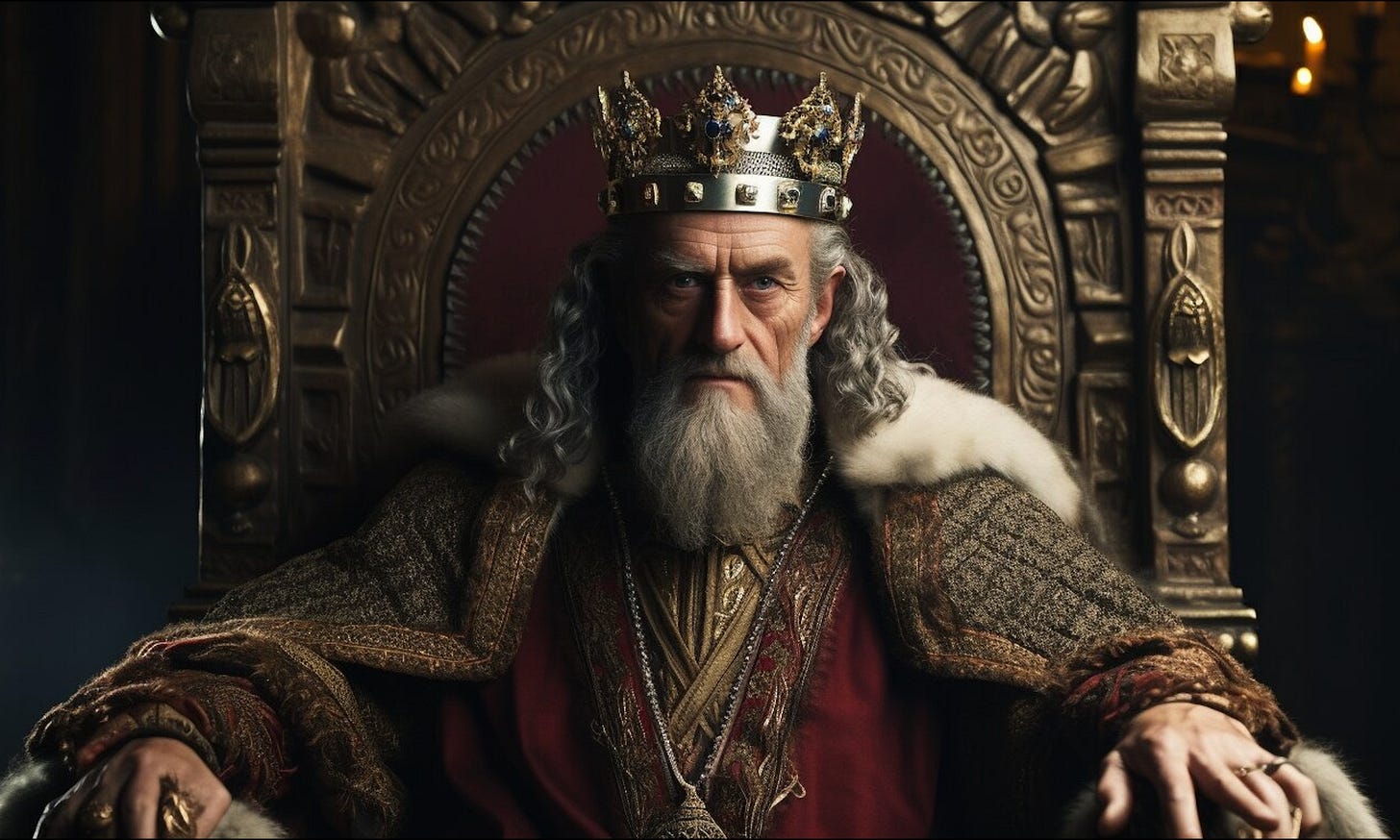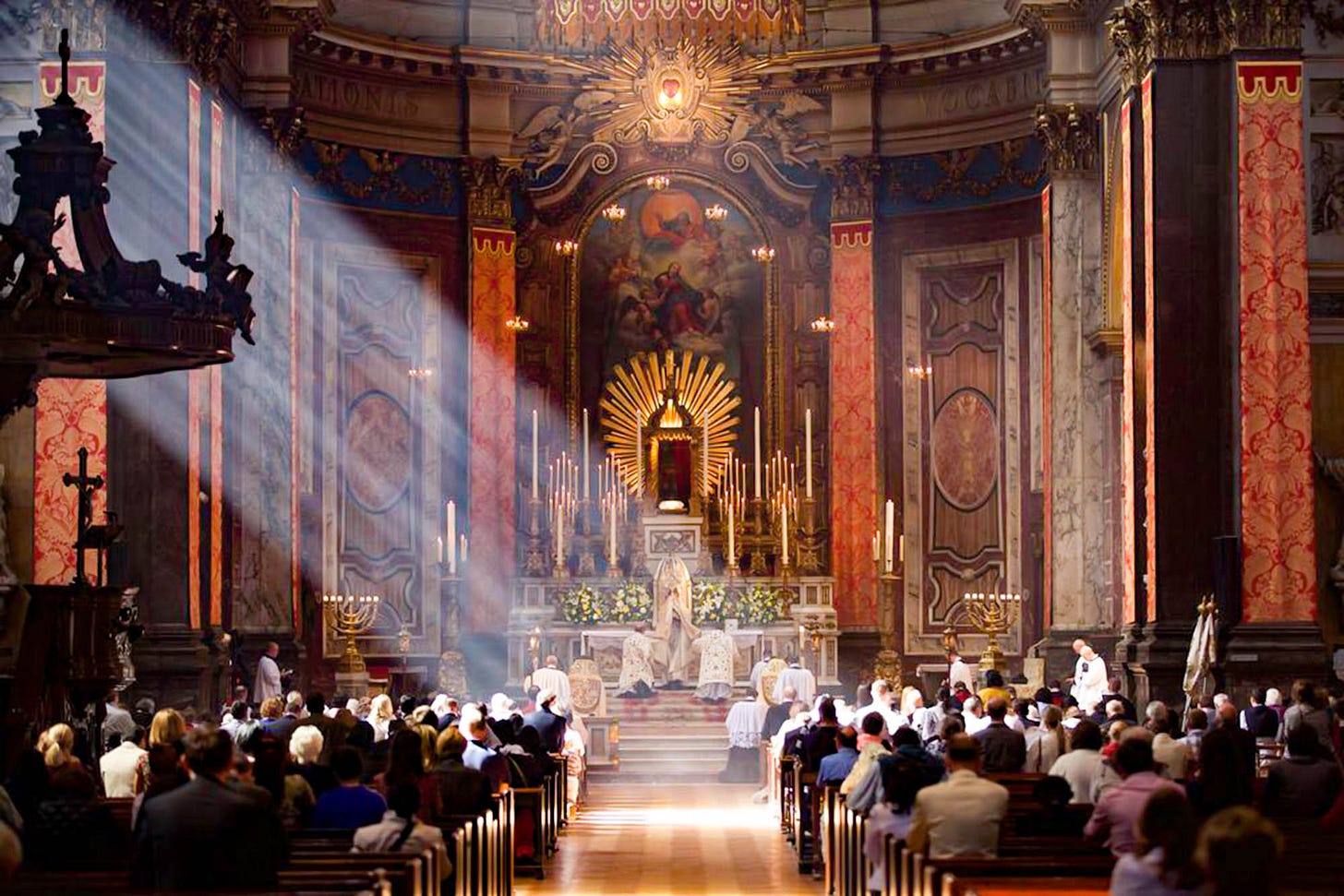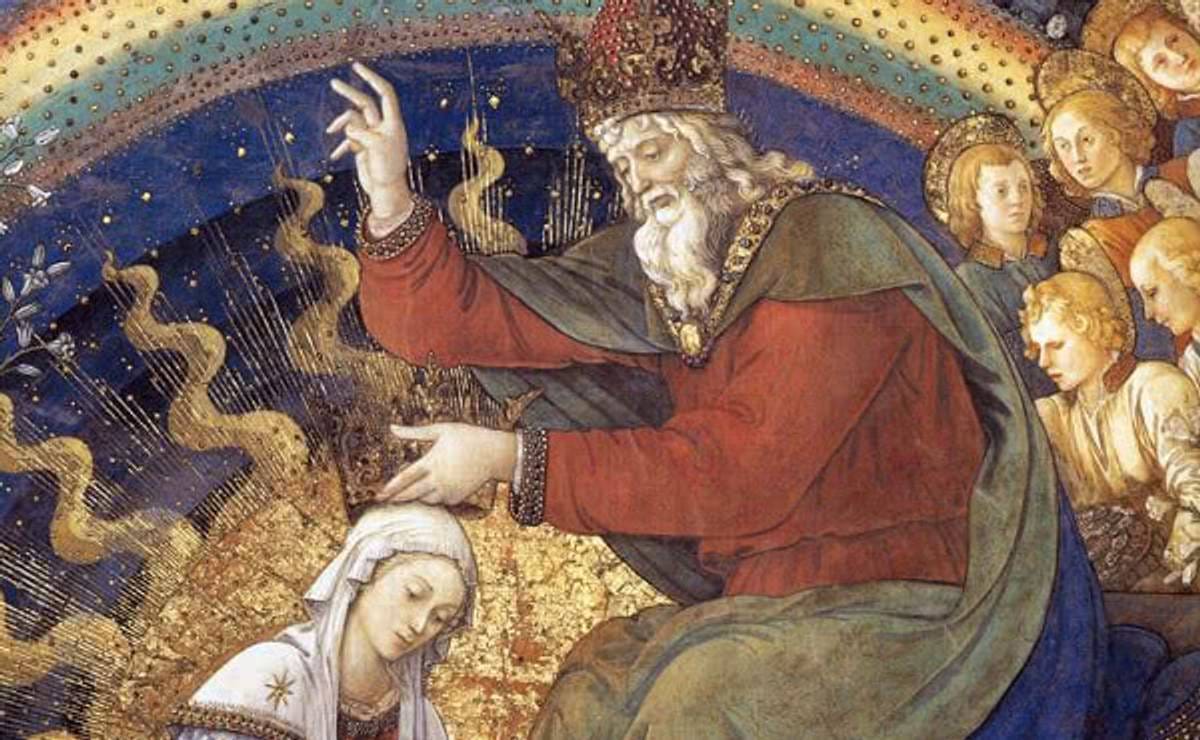Why Every Man Needs Three Fathers
To grow and heal personally and collectively, Western man must return to his roots and embed himself in a structure of profound stability in the Earthly, Cultural & Divine Fathers
We’ve seen a breakdown in the role modern men play in society and the ramifications of this are obvious—cultural mediocrity, a sense of meaninglessness, mental health issues, and with that a declining civilisation. In this piece, I aim to reawaken the wisdom of old that can aid us in rooting ourselves in deep spiritual and personal truths.
To begin our journey, it’s important to grasp just how radical an experiment has been played on Western man.
For decades now, men of the West have been both explicitly and tacitly informed that gender is some illusion, a culturally defined mythology with no root in reality. We could lay the blame on the stinging critique of Marxism and its unrelenting desire to explain how supposedly unjust systems of power work, or we could blame Western man himself, who, following the demoralisation of the World Wars became too wounded and withdrawn to stave off ideological attacks on his way of life.
Either way, a nice place to start is with a quote from the feminist author Judith Butler, who stated in her 1990 book Gender Trouble:
There is no gender identity behind the expressions of gender… (gender) identity is performatively constituted by the very “expressions” that are said to be its results (1).
From Butler, we see a malady that’s taken over the West. She’s inferring that the cultural, spiritual and biological nature of the male is nothing but a fiction, a tool that can be used to enforce oppression and maintain unjust power systems.
This may well read like the typical, tawdry leftism we’ve become all too accustomed to in the modern West, yet it is extremely radical in historical context.
Clear articulations of gender are central to the great civilisations of history, and this is because they map so accurately to the biologies of males and females, but also because masculinity and femininity are core cultural, and, as we’ll see soon, spiritual forces that bring balance to society.
Common examples are the Yin (feminine) & Yang (masculine) forces of Ancient Chinese philosophy, Rama and Sita from the Hindu tradition and Adam & Eve from the Christian foundation story. Despite emanating from differing groups and at different points in history, the masculine and feminine articulations are oddly similar.
In each of the above, the masculine pole adheres to what today’s leftists would call a ‘traditional’, and arguably ‘sexist’, structure. Yet this tells us that an intuitive understanding of masculine/feminine dynamics cannot be limited to Western Culture. To begin with the Yin & Yang, the two poles are not meant to compete, but to complement the other and can be expressed simply thusly:
Yin: The feminine, dark, cold, chaotic, passive power
Yang: The masculine, light, orderly, warm power
In Yin-Yang philosophy, the ever-moving interaction between the masculine and feminine poles creates friction known as ‘Chi’, which translates to ‘life force’, the applied spiritual tradition then is about balancing Yin and Yang energies. The masculine and feminine forces are unique, yet complementary, divided, yet one.
We see a similar articulation in the Rama & Sita story (2). In said story, Rama must fight the demon king ‘Ravana’ to save Sita, and during one part of the story rich with symbology, Rama protects Sita from the wild forest and all that lurks by encasing her in a ‘magic circle’. This is archetypal masculine behaviour—the drawing of borders, the ordering of space, protection. Of course, modern Western feminists tend to see all borders as a form of ‘oppression’ that must be destroyed. Yet, while some borders and boundaries can indeed be oppressive if they are drawn to tightly, or in fear rather than love, borders amd boundaries are vital, even life-giving, to ensure we don’t slip into chaos and anarchy.
The next part of the story bears great resemblance to the Adam and Eve story. Sita is fooled by the demon-king Ravana into leaving the magic circle, being led astray by her naive compassion for a helpless old man (who is really Ravana in disguise). The symbology here tells us that a woman’s compassion (Yin) must be guarded by a man’s wisdom (Yang) to not be abused. His boundaries are necessary. In the Adam and Eve story, Eve is led astray by a similar demonic figure in the form of the snake who temps her by piquing her curiosity to eat from the Tree of Good and Evil, thereby disobeying God—another masculine figure who constructed the boundaries of the Garden of Eden.
What we see in the Adam and Eve story bears great parallels to Western man. Eve, tempted by evil, eats from the Tree and then entices Adam to do the same. Popular figures such as Dr Jordan Peterson (3) have interpreted this as the fault of Adam and his weakness, however, I’d say that’s only semi-true. The subtext I see is a lustful Adam paying the ultimate price for following the symbolic temptation a woman provides. His sin is that he ignores the Will of God for the lustful pull of a woman. Later in the Bible, this same dynamic is poetically expressed by King Solomon:
My son, attend unto my wisdom, and bow thine ear to my understanding: That thou mayest regard discretion, and that thy lips may keep knowledge.
For the lips of a strange woman drop as an honeycomb, and her mouth is smoother than oil: But her end is bitter as wormwood, sharp as a two-edged sword.
Her feet go down to death; her steps take hold on hell. (4)
Again, what we have in the above is vital instruction providing metaphysical boundaries for a beloved son, the archetypal role of a father. What we learn from Adam is that he should’ve adhered to the boundaries God created, rather than follow his lustful lower nature.
However, what does all this mean for modern Western men, men often distanced from their fathers, divorced from their culture and tradition, and so grounded in materialist modernity spiritual truths are little more than fairy stories?
The Earthly Father
Judith Butler’s quote at the top of this piece set the scene concerning modern liberal conceptions of gender, and this was inevitably going to lead to ‘Guardianista’ columnists opining that society will no longer require men once scientists can create semen in a lab. This disavowal of the importance of men has led to several huge problems regarding the rearing of healthy young males, such as:
Divorce is commonplace, with the mother usually acquiring custody of children, meaning many young males grow up with the mother
Many couples don’t bother to marry and some don’t even bother to date after having children, meaning many children grow up without a present father at all, and
The strength of the Welfare State now means the onus is taken off a man to provide, and women (and their children) become the property of the state apparatus, while the role of the father is diminished
While it may make sense through a feminist lens to divorce children from fathers, reality draws a different picture. Astonishing figures from UK prisons show 76% of male inmates lacked an active and present father figure growing up (6)—the same figures can be found for youngsters caught up in gang violence in inner-city London. Young males growing up in fatherless homes are also more likely to experience mental health issues such as anger, anxiety and depression (7).
The above statistics may be shocking but will be of little surprise to many. This is because, in my view, men have an instinctual feel for this, we intuitively have a non-rational wisdom deep in the soul that is oft-ignored by the hyper-intellectualism of modernity, and that wisdom informs us that sons need fathers.
This phenomenon spreads beyond our species, too. The male initiation specialist and Catholic mystic Richard Rohr outlines a powerful story in his work that explains this (8).
The story revolves around a set of unruly young male elephants causing havoc at a sanctuary in Thailand. These elephants had been separated from their tribe—which meant their fathers/elders—and were tipping over people’s cars and charging the rangers. The handlers were at a loss with what to do with the young elephants until the problem was solved when they took in several elder male elephants. Once these older, wiser and stronger elephants were introduced, the younger elephants calmed down immediately, it was as if the presence of the elders calmed their nervous systems.
Rohr writes in another of his works that young men in gangs without fathers are “seventeen-year-old boys trying to get father energy from other seventeen-year-old boys” (9). Once we understand this dynamic, we can understand why a particularly aggressive and crass ‘gangster rap’ has taken over the West, a music form stemming from the African American ghettos of the USA, another location with very low levels of present and active fathers (10). It also explains the huge popularity of Andrew Tate, who remains hugely popular with the feminised Western male youth.
So, young males need fathers and they don’t have them, no surprise there. Yet things get worse still when one realises this ‘father wound’ goes beyond the immediate father/son relationship and can impact a whole culture. This, as you might expect, has happened to the Western world.
The Cultural Father
The notion that cultures and civilisations can have masculine or feminine energies underpinning them is nothing new. One of the more famous expressions of this comes from Julius Evola’s work in which he articulates the masculine principle as a ‘solar’ force, and the feminine as a ‘lunar’ force.
This inference has immediate similarities with the Yin-Yang model discussed earlier in which the masculine is characterised by the sun and the feminine by the moon. Yet, Evola didn’t see the Christian West as a ‘solar’ force, he was more sympathetic to Islam and pre-Christian Roman culture, believing they better articulated the ‘eternal masculine’ principle (11). This may explain why many young men drawn to traditionalist teachings opt to explore Bronze Age, Roman and Pagan themes in their spiritual and cultural lives. As a traditionalist Christian, I’d disagree with this approach, but that is a piece for another time. The important thing to note here is that cultures and civilisations carry gendered energy. If we take the example of the errant youth previously discussed, we can build a richer picture of how this works.
A father in the home is the representative of order. He implements boundaries. He has this authority due to his physical power, his masculine energy, and the son’s subconscious craving for elder guidance and wisdom. Just as a son needs that guidance, so too do the men of a given culture, it is, in turn, the ‘father culture’ that informs fathers in the home of the norms and values to govern the household in wisdom, order and love.
In the West, our ‘Cultural Father’ has been Christianity, often flavoured by its unique national formations (Italian Catholicism, Nordic Protestantism, Anglicanism, et cetera), with its views on marriage, childrearing, gender and social order still underpinning our moral compass today. This is true for atheists, which is why even Richard Dawkins views himself as a ‘cultural Christian’ (12). This is a very important distinction, as we are not speaking here about God or religious belief, we are talking about culture, that is the traditions, laws and customs that act as fatherly boundaries for a civilisation.
Many of you reading will know that those boundaries are under heavy and sustained attack by ‘freedom’-obsessed modern liberalism, and it’s no coincidence that such changes have been implemented during/after the rise of feminism. Once feminism broke the mould, then came the plethora of ‘progressive’ causes such as gay marriage (in churches), trans-rights (even for children), and so on. In essence, the West has been feminised, and not by a sweet traditional femininity, but by a militant, destructive force that promises freedom yet creates bondage.
The Divine Father
Finally, we come to the Divine Father. While it’s true many have no interest in this spiritual expression, seeking only the wisdom of their culture or the material earthly father, the Divine Father is essential in informing the nature of cultural values. In the Christian tradition, such values stem from revelation via Christ and the prophets, if one is to read the Sermon on the Mount, you’d have a solid understanding of the revealed truths that have guided Western morality and spirituality for thousands of years.
Yet, for folks who are more spiritually inclined—or find themselves challenged by darkness no worldly power can overcome—the mystical door can open to reveal spiritual rebirth. Such ‘seekers’ report varying levels of ecstasy as they find communion with The Father in moments of egoless contemplation (13). While such experiences remain the territory of the mystic and the esoteric, they are vital for the collective in reaffirming the wisdom of the prophets and solidifying the integrity of the cultural values a society holds to.
Returning Home
While I intend to offer much more comprehensive offerings down the line in the form of courses, coaching and men’s circles on the above subject matter, for those interested, here are some simple things you can engage in now to solidify your life:
Earthly Father
Connection with male elders is vital, especially with the father/father figure. For those who don’t have a father figure, or a very strained relationship, jump to the Cultural Father.
Explore what your father gave you (life, financial support, guidance, etc) and be thankful. Next be clear on what he didn’t give you, and instead of turning to anger, discover where you can source such things now
Work to weed out any resentment towards your father (understanding he has been lost too can help). Staying angry locks us in a vengeful, teenage mentality
If possible, try to connect with him, and show an interest in his interests
Contemplate that he will get old, what sort of son can you be to aid him when he becomes frail?
Know we don’t have to be perfect, nor have a perfect relationship, an open channel of communication is good enough
Cultural Father
Explore your tradition—this can have political, cultural, religious and spiritual dimensions, so explore where your heart takes you and come to learn the wisdom of your forefathers
Begin a ‘practice’ in which you start living your tradition. That means striving to follow its dictates, embrace the advised sacrifices and engage in the relevant celebrations. This is especially important in untying a man from materialist modernity
Find figures you respect and can emulate (these act as guides). These figures don’t have to be perfect, you may even only respect their achievements in one area, but seek elders both in real life and online that adhere to your tradition and accept their teachings where relevant in your personal, familial, romantic, social, working, national and spiritual life
Discover and read relevant religious, spiritual and philosophical texts relating to your tradition. Try and engage with such texts daily, even if it’s just for two minutes
Divine Father
Devote a short period each day, ideally morning and evening, to prayer, contemplation and/or meditation. If you’re new to such practices, seek out guided prayers/meditations relating to your tradition online
If prayer/meditation is too ‘out there’, try to walk in nature once per day and let go of thoughts about yourself. Better yes, thoughts entirely. Try and listen to the stillness of nature, watch a tree sway in the wind, see a bird fly across the park, have no opinions, let yourself BE
Embracing this path can lead to feelings ranging from joy to fear, from confusion to clarity, and everything in between. This is a good sign. The dark clouds are moving and the light is getting in. Your inner darkness needs to be felt and burnt off. At such a point it’s worth striving to find a spiritual guide in the real or online world that can aid you in deepening your understanding. While such movements can be unnerving, they are a good sign that you’re spirit is stirring
These are just a few basic precepts to begin your journey. You’re more than welcome to reach out to me if you’d like to connect on these issues. As I say, I’ll seek to build more comprehensive offerings down the line that will hit on a more profound level. I’ve certainly found such practices life-changing.
If you’d like to support me and my work, do consider supporting me with a donation down below.
References
1: Butler, J. 1990. Gender Trouble: Feminism and the Subversion of Identity. Routledge, New York, 33.
2: BBC. The story of Rama and Sita: https://www.bbc.co.uk/teach/school-radio/articles/zc84cmn
3: Kaczor, Christopher. Jordan Peterson on Adam and Eve: https://www.thepublicdiscourse.com/2018/04/21281/
4: Holy Bible. KJV. Proverbs 5.
5: UK Gov. ONS. 2011. Divorces in England and Wales: 1970-2011: Click here (See Figure 2)
6: Prison Reform Trust 2016. Pg 6: https://prisonreformtrust.org.uk/wp-content/uploads/2022/05/Prison-the-facts-summer-2016.pdf
7: PubMed. Father absence and trajectories of offspring mental health across adolescence and young adulthood: Findings from a UK-birth cohort: https://pmc.ncbi.nlm.nih.gov/articles/PMC10666570/
8: Rohr, Richard. Adam’s Return.
9: Rohr, Richard. From Wild Man to Wise Man.
10: Gretchen Livingston and Kim Parker. Pew Research Centre. Chapter 1. Living Arrangements and Father Involvement. Click here
11: Evola, Julius. 1995. Revolt Against the Modern World: Politics, Religion, and Social Order in the Kali Yuga. Inner Traditions.
12: James, William. 1982. The Varieties of Religious Experience: a Study in Human Nature. Penguin Books. New York








